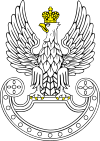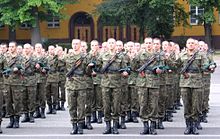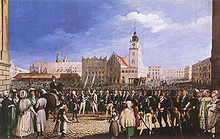- Polish Army oaths
-

Polish
Armed ForcesBranches  Land Forces
Land Forces
 Air Force
Air Force
 Navy
Navy
 Special Forces
Special ForcesHistory Timeline
WarsPersonnel Senior officers
Rank insignia
Awards
OathsEquipment Land Forces
NavyThe following is a list of the Polish military oaths, both historical and contemporary.
Contents
Contemporary
This oath is in current use in the Polish Armed Forces.
Polish
Ja żołnierz Wojska Polskiego,
Przysięgam,
Służyć wiernie Rzeczypospolitej Polskiej,
Bronić jej niepodległości i granic,
Stać na straży Konstytucji,
Strzec honoru żołnierza polskiego,
Sztandaru wojskowego bronić,
Za sprawę mojej Ojczyzny,
W potrzebie krwi własnej ani życia nie szczędzić,
Tak mi dopomóż Bóg
English
I, as a soldier of the Polish Army,
I fully Swear,
To Serve loyally to the Republic of Poland,
Defend her independence and borders,
Stand on guard of the constitution,
Defend the honour of a Polish soldier,
Defend the military banners of the Army,
In matter of my homeland,
If needed to give my blood or life,
So help me God!
Historical
Kościuszko's Uprising (1794)
The Oath of Tadeusz Kościuszko, sworn on the old town market of Kraków on 24 March 1794, at the outbreak of the Kościuszko Uprising.
Polish text
- Ja, Tadeusz Kościuszko, przysięgam w obliczu Boga całemu Narodowi Polskiemu, iż powierzonej mi władzy na niczyj prywatny ucisk nie użyję, lecz jedynie jej dla obrony całości granic, odzyskania samowładności Narodu i ugruntowania powszechnej wolności używać będę. Tak mi Panie Boże dopomóż i niewinna męka Syna Jego.
English translation
- I, Tadeusz Kościuszko, hereby swear in the face of God to the whole Polish Nation, that I shall not use the power entrusted to me for anyone's personal oppression, but only for the defence of the integrity of the borders, for retaking the sovereignty of the Nation, and for strengthening the universal freedom. So help me God and the innocent Passion of His Son!
Polish Legions in World War I
Main article: Oath CrisisThe oath was prepared by the German authorities and on July 3, 1917 presented to Gen. Hans Beseler, then the German governor of Warsaw and the highest authority of the planned Polnische Wehrmacht military formation. He was swear the Polish Legions with it, thus putting them under direct German command.
However, as the Polish Legions were already enraged with the German and Austro-Hungarian plans of limiting the plans for Polish independence and Józef Piłsudski, the Legions' leader, was dismissed by his Austro-Hungarian superiors. In such a political climate most of the soldiers of the Legions declined to swear allegiance to a non-existing king of Poland and foreign government, thus leading to the so-called Oath Crisis
Polish text
- Przysięgam Panu Bogu Wszechmogącemu, że Ojczyźnie mojej, Polskiemu Królestwu, i memu przyszłemu Królowi na lądzie i wodzie i na każdym miejscu wiernie i uczciwie służyć będę; że w wojnie obecnej dotrzymam wiernie braterstwa broni wojskom Niemiec i Austro-Węgier oraz państw z nimi sprzymierzonych; że będę przełożonych swych i dowódców słuchał, dawane mi rozkazy i przepisy wykonywał i w ogóle tak się zachowywał, abym mógł żyć i umierać jako mężny prawy żołnierz polski. Tak mi, Boże, dopomóż!
English translation
- I hereby swear to the God Almighty, that I shall loyally serve my Fatherland, Kingdom of Poland and my future King, both on water and on land, and in any circumstances; that during this war I shall remain a loyal brother in arm of the soldiers of Germany and Austria-Hungary and of the states allied to them; that I shall obey my superiors and commanders, fulfil the orders and generally behave so as to be able to live and die as a brave and just Polish soldier. So help me God!
Polish Army in France (1918)
Oath written by General Józef Haller and the Polish National Committee in 1918. It was used by the units of the Blue Army, that is the Polish Army formed in France at the end of the First World War.
Polish text
- Przysięgam przed Panem Bogiem Wszechmogącym, w Trójcy Świętej Jedynym, na wierność Ojczyźnie mojej, Polsce, jednej i niepodzielnej. Przysięgam, iż gotów jestem życie oddać za świętą sprawę jej zjednoczenia i wyzwolenia, bronić sztandaru mego do ostatniej kropli krwi, dochować karności i posłuszeństwa mojej zwierzchności wojskowej, a w całym postępowaniu moim strzec honoru żołnierza polskiego. Tak mi, Panie Boże, dopomóż.
English translation
- I swear in face of God Almighty, One in the Holy Trinity, my faithful allegiance to my Fatherland, Poland, sole and indivisible. I swear that I'm ready to give my life for the sacred cause of her unification and liberation, I swear to defend my banner to the last drop of my blood, to remain loyal and obedient to my commanders, and that by all my deeds I will guard the honour of the Polish soldier. So help me God!
Greater Poland Uprising (1919)
To avoid an open conflict with Germany, formally the forces fighting in the Greater Poland Uprising formed a separate state and the armed forces were separate from the Polish Army. Hence the oath of the armed forces of Greater Poland was different from that used by other Polish units elsewhere.
Polish text
- W obliczu Boga Wszechmogącego w Trójcy Świętej Jedynego ślubuję, że Polsce, Ojczyźnie mojej i sprawie całego Narodu Polskiego zawsze i wszędzie służyć będę, że kraju Ojczystego i dobra narodowego do ostatniej kropli krwi bronić będę, że Komisarzowi Naczelnej Rady Ludowej w Poznaniu i dowódcom, i przełożonym swoim mianowanym przez tenże Komisariat, zawsze i wszędzie posłuszny będę, że w ogóle tak zachowywać się będę, jak przystoi na mężnego i prawego żołnierza-Polaka, że po zjednoczeniu Polski złożę przysięgę żołnierską, ustanowioną przez polską zwierzchność państwową.
English translation
- In the face of God Almighty, One in the Holy Trinity, I hereby swear my everlasting allegiance to Poland, my Fatherland and to the whole Polish Nation. I swear to defend the Fatherland and the national good to the last drop of my blood. I swear loyalty and obedience to the Commissioner of the Supreme National Council in Poznań and my commanders, and to my superiors named by the Commission. I swear to always behave as a brave and valiant soldier and Pole, and that when Poland is united I shall take an oath accepted by the Polish military authority.
Second Polish Republic (1924)
Between the World Wars the unified Polish Army introduced three oaths, each for different denomination. It was passed by the Basic Duties of a Soldier Act of 18 July 1924 and confirmed by the order of the Ministry of Military Affairs of 15 July 1927.
Polish text
- Christians
- Przysięgam Panu Bogu Wszechmogącemu, w Trójcy Świętej Jedynemu być wiernym Ojczyźnie mej, Rzeczypospolitej Polskiej, Chorągwi wojskowych nigdy nie odstąpić. Stać na straży konstytucji i honoru żołnierza polskiego. Prawu i Prezydentowi Rzeczypospolitej Polskiej być uległym. Rozkazy dowódców i przełożonych wiernie wykonywać. Tajemnic wojskowych strzec. Za sprawę Ojczyzny mej walczyć do ostatniego tchu w piersiach. I w ogóle tak postępować, aby mógł żyć i umierać jak prawy żołnierz polski. Tak mi dopomóż Bóg i święta Syna jego męka. Amen.
- Muslims
- Przysięgam Panu Bogu Jedynemu być wiernym Ojczyźnie mej, Rzeczypospolitej Polskiej, chorągwi wojskowych nigdy nie odstąpić, stać na straży Konstytucji i honoru żołnierza polskiego, prawu i Prezydentowi Rzeczypospolitej Polskiej być uległym, rozkazy dowódców i przełożonych wiernie wykonywać, tajemnic wojskowych strzec, za sprawę Ojczyzny mej walczyć do ostatniego tchu w piersiach i w ogóle tak postępować, abym mógł żyć i umierać jak prawy żołnierz polski. Bereetjum Mine Allachivy Veresulini illeclezine a hetdeteum minel masiurkine BilWałłagi, Tałłagi, Amin.
- Other denominations
- Przysięgam Bogu Wszechmogącemu być wiernym Ojczyźnie mej, Rzeczypospolitej Polskiej, chorągwi wojskowych nigdy nie odstąpić, stać na Straży Konstytucji i honoru żołnierza polskiego, prawu i Prezydentowi Rzeczypospolitej Polskiej być uległym, rozkazy dowódców i przełożonych wiernie wykonywać, tajemnic wojskowych strzec, za sprawę Ojczyzny mej walczyć do ostatniego tchu w piersiach i w ogóle tak postępować abym mógł żyć i umierać jak prawy żołnierz polski. Tak mi dopomóż Bóg. Amen.
English translation
- Christians
- I swear to God Almighty, One in Holy Trinity, my faithful allegiance to my Fatherland, Republic of Poland. I swear always to stand by the military banners, to uphold the constitution and guard the honour of the Polish soldier, to be obedient to the law and to the President of Poland, to faithfully carry orders of my commanders and superiors, to keep the military secrets, to fight for my Fatherland to the last breath in my breast, to always behave so as to live and die as a true Polish soldier. So help me God and the sacred Passion of His Son! Amen.
- Muslims
- I swear to the Only God my faithful allegiance to my Fatherland, Republic of Poland. I swear always to stand by the military banners, to uphold the constitution and guard the honour of the Polish soldier, to be obedient to the law and to the President of Poland, to faithfully carry orders of my commanders and superiors, to keep the military secrets, to fight for my Fatherland to the last breath in my breast, to always behave so as to live and die as a true Polish soldier. Bereetjum Mine Allachivy Veresulini illeclezine a hetdeteum minel masiurkine BilWałłagi, Tałłagi, Amin.
- Other denominations
- I swear to God Almighty my faithful allegiance to my Fatherland, Republic of Poland. I swear always to stand by the military banners, to uphold the constitution and guard the honour of the Polish soldier, to be obedient to the law and to the President of Poland, to faithfully carry orders of my commanders and superiors, to keep the military secrets, to fight for my Fatherland to the last breath in my breast, to always behave so as to live and die as a true Polish soldier. So help me God! Amen.
Armia Krajowa (WWII)
Since the Armia Krajowa was formed of various smaller resistance organizations, initially the words of the oath used by the Polish underground varied. The following is the text for the Christians serving in the Home Army. Other denominations used different variations of it.
Polish text
- W obliczu Boga Wszechmogącego i Najświętszej Maryi Panny, Królowej Korony Polskiej, przysięgam być wierny Ojczyźnie mej, Rzeczypospolitej Polskiej. Stać nieugięcie na straży jej honoru, o wyzwolenie z niewoli walczyć ze wszystkich sił, aż do ofiary mego życia. Prezydentowi Rzeczypospolitej Polskiej, Naczelnemu Wodzowi i wyznaczonemu przezeń Dowódcy Armii Krajowej będę bezwzględnie posłuszny a tajemnicy niezłomnie dochowam, cokolwiek by mnie spotkać miało. Tak mi dopomóż Bóg.
English translation
- Before God Almighty and Mary the Blessed Virgin, Queen of the Polish Crown, I pledge allegiance to my Fatherland, the Republic of Poland. I pledge to steadfastly guard Her honour, and to fight for Her liberation with all my strength, even to the extent of sacrificing my own life if that is needed. I pledge unconditional obedience to the President of Poland, the Commander-in-Chief of the Republic of Poland, and the Home Army Commander whom be appointed. I pledge to resolutely keep secret whatever may happen to me. So help me God!
1st Polish Army (1943)
First taken on 15 July 1943 in Sielce at the Oka River. It was used by the Soviet-backed military of Poland until the end of the Second World War and afterwards.
Polish text
- Składam uroczystą przysięgę ziemi polskiej, broczącej we krwi, narodowi polskiemu, umęczonemu w niemieckim jarzmie, że nie skalam imienia Polaka, że wiernie będę służył Ojczyźnie.
- Przysięgam ziemi polskiej i narodowi polskiemu rzetelnie pełnić obowiązki żołnierza w obozie, w pochodzie, w boju, w każdej chwili i na każdym miejscu, strzec wojskowej tajemnicy, wypełniać wiernie rozkazy oficerów i dowódców.
- Przysięgam dochować wierności sojuszniczej Związkowi Radzieckiemu, który dał mi do ręki broń do walki z wspólnym wrogiem, przysięgam dochować braterstwa broni sojuszniczej Czerwonej Armii.
- Przysięgam ziemi polskiej i narodowi polskiemu, że do ostatniej kropli krwi, do ostatniego tchu nienawidzieć będę wroga - Niemca, który zniszczył Polskę, do ostatniej kropli krwi, do ostatniego tchu walczyć będę o wyzwolenie Ojczyzny, abym mógł żyć i umierać jako prawy i uczciwy żołnierz Polski.
- Tak mi dopomóż Bóg!
English translation
- I hereby swear to the blood-rinsed Polish land, to the Polish nation tormented by German yoke, that I will not desecrate the name of a Pole and that I will courageously serve my Fatherland.
- I swear to the Polish land and to the Polish people that I will honestly serve the duties of a soldier, in march and in battle, in the camp and at any other moment I will guard the secrets and fulfil the orders of my officers and commanders.
- I swear to be a loyal ally of the allied Soviet Union, which gave me the arms to fight our common enemy, and I swear I will preserve the brotherhood of arms with the allied Red Army.
- I swear to the Polish land and to the Polish nation that to the last drop of blood, to the last breath shall I hate the enemy - the German who destroyed Poland; to the last drop of blood, to the last breath shall I fight for the liberation of my Fatherland, so that I could live and die as a rightful and honest soldier of Poland.
- So help me God!
Modern oath
Following the establishment of the Third Polish Republic in 1989, the oath was again changed and significantly shortened. There is only one oath for all denominations, although each soldier has the option to omit the reference to God.
Polish
Ja żołnierz Wojska Polskiego,
Przysięgam,
Służyć wiernie Rzeczypospolitej Polskiej,
Bronić jej niepodległości i granic,
Stać na straży Konstytucji,
Strzec honoru żołnierza polskiego,
Sztandaru wojskowego bronić,
Za sprawę mojej Ojczyzny,
W potrzebie krwi własnej ani życia nie szczędzić,
Tak mi dopomóż Bóg
English
I, as a soldier of the Polish Army,
I fully Swear,
To Serve loyally to Republic of Poland,
Defend her independence and borders,
Stand on guard of the constitution,
Defend the honour of a Polish soldier,
Defend the military banners of the Army,
In matter of my homeland,
If needed to give my blood or life,
So help me God!
Note on translation
The word "Ojczyzna" should be translated into English as "Fatherland", as it derives from the word "ojciec" (Polish: "father"). Although, historically because of the grammatical gender of the word "ziemia" ("land", "ground")its form is feminine. goo.gl / ffUXt
Categories:- Military of Poland
- Military oaths
Wikimedia Foundation. 2010.


